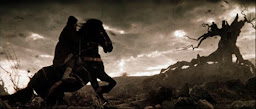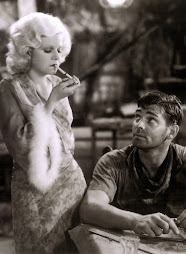 A 1927 silent feature from MGM starring Lon Chaney (in a duel roll!)
A 1927 silent feature from MGM starring Lon Chaney (in a duel roll!)

He's Grandfather Wu and (grown-up grandson) Mandarin Wu!
Based on a 1914 stage play by Henry Maurice Vernon and Harold Owen, the film centers around Mandarin Wu's daughter, a young Chinese girl who is betrothed to a young Chinese man but who instead falls in love with the handsome American guy she meets one day in her garden.
It's a pretty thin story for the first two-thirds, where we watch Wu's daughter moon over her American boyfriend, and we learn the American boy's father is a stoopid bigot and that they're moving back to America as soon as possible so say goodbye to romance. But the hitch, of course, is that the Chinese girl is pregnant by her American fella, so it's not as simple as saying, "I'll write to you! I'll always remember our interludes in the garden!" No, the daughter pleads with her lover to stay, and he loves her so much, he really wants to, blah blah romancecakes. The story picks up once Mr. Wu suspects his daughter's illicit affair and he begins spying on her.
When he finds out the truth, Wu has no choice but obey ancient Chinese law and kill his own daughter so that honor can be restored to the family. Mr. Wu also sets up a deliciously evil game of death involving the American boyfriend and his family. It's only in this last third of the film that there's any real tension or dramatic stakes. Funny how death and the threat of violence can suddenly make things so much better.
Best shot of the film is when Wu's daughter willingly kneels down in the great hall so that her father can kill her and we watch as Wu slowly draws his sword and raises it above her head, both father and daughter in total anguish over this "tradition" which demands the restoration of honor through death, and then the camera pulls back and a curtain is drawn over the scene before we can witness the actual beheading. Very effective.
Other than Wu's vengeance in the last part of the film, the only thing to recommend it is Chaney's performance and make-up. As the Grandfather Wu, Chaney is utterly unrecognizable. His ability to be so human and rascally underneath such extensive make-up is what makes Lon Chaney a genius, of course. And in his big emotional scenes as Mandarin Wu, Chaney is able to garner sympathy from the audience, even as he prepares to kill his own daughter or when he plays the twisted game of revenge against the Americans. Even in a story as thin as this, Chaney elevates the material by making his characters real. Grandfather Wu is a wisely mischevious old codger, a loving grandfather who wants to bring the teachings of the West to his grandson. As the adult grandson, Chaney plays Wu as a loving husband and father who is nevertheless bound to uphold his Chinese traditions. When he finally goes over the edge into murder and vengeance, it's hard to hate him. There are no hisses for the sadistic villain; instead, your heart breaks as you witness his descent into cruelty all because he is anguished over the loss of the people he loves.
One thing the film never fully addresses (at least not to my satisfaction) is the contradiction between young Wu's education by a Westerner -- something Grandfather Wu wanted for his grandson so that he might engage more fully with the world -- followed by father Wu's strict adherance to the harsh Chinese law of honor that requires he kill his own daughter. We see Mr. Wu entertaining Americans and respecting his teacher, Mr. Muir, but in the end it seems that none of that Westernization had any effect at all on Wu's thinking as he prepares to murder for the sake of the film's idea of Chinese "honor." It would have been nice if the film had addressed this issue a little more and shown how Wu came to finally reject his Westernized education and embrace the ancient Chinese ways. If they had made the story more about Wu's transformation from Westernized Chinese man to old school honor killing father it would have been far more interesting and challenging as a film. Instead, Wu's Westernized upbringing is little more than a plot device that allows the Wu family and the American family to be brought together in a few scenes. It's like the filmmakers recognized that East vs. West was a big motif lingering around the edges of the film but they were never able to actually capitalize on this motif and explore the issue in its fullest. Perhaps I'm just looking for the film to take what is subtextual and make it into actual text, but I think if they had made this angle more explicit it would have made for a more complicated and memorable film.












_01.jpg)







No comments:
Post a Comment